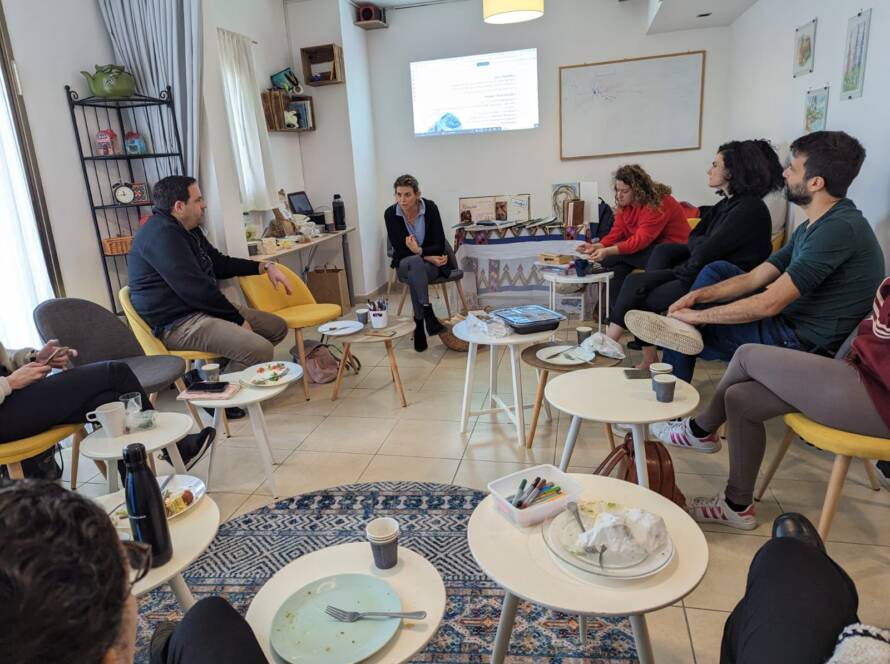
AS FEATURED ON THE TIMES OF ISRAEL
It was one of fifty Zoom interviews.
A half-hour slot. A couple on the screen. She sat slightly angled away, her expression tense. He stared downward, rubbing his hand. There was a silence before the words came—and when they did, they landed like bricks.
They looked like they had already tried everything. Therapists. Conversations. Time. This wasn’t their first step—but it felt like their last hope.
He had served over 500 days in the reserves—combat, not logistics. His wife had given birth while he was away. Her parents had been living in their home for months after being evacuated during the war. His brother—his best friend—had been critically injured in another combat unit and was in a coma for six months. And still, he kept fighting.
Then he said something I won’t forget:
“I found myself in the hardest place of my life. I was raised with strong Jewish values—to be present for my wife, my children, my family. But I was in the field, ignoring their cries while staying loyal to my unit and my country. It was a complete contradiction of everything I believe. I feel like I failed them.”
This wasn’t an isolated story.
In nearly every one of the 50 interviews we conducted over the past month, I’ve heard echoes of this same heartbreak. Soldiers from Duvdevan—some of the most elite and committed fighters in Israel—returning home to relationships that feel fragile, distant, and in quiet crisis.
Then came his partner’s voice.
“He comes home completely disconnected. He needs a break. I need a break. But I feel guilty even asking. We’ve lost the ability to talk. We’re just surviving.”
What Happens After the War
Since October 7th, Israel has responded to the crisis with strength and urgency. The focus has rightly been on treating the wounded, expanding mental health services, and mobilizing communities to meet immediate needs. But amidst this collective effort, one group has been quietly left behind: couples.
One space continues to go largely unnoticed—the space between two people. There is little guidance for how to find your way back to one another after trauma. Few resources exist to support love, intimacy, or trust when both partners are emotionally depleted.
While the soldier is often welcomed into a system of care—resilience centers, therapy, support groups—the relationship itself is left to weather the storm in silence. And in that silence, the distance grows.
“This is the hardest part,” one woman shared during an interview. “We survived everything—his deployment, the fear, even the injury to his friend. But now that he’s home, I don’t know how to reach him. And I don’t think he knows how to reach me.”
This isn’t about what happened on the battlefield. It’s about what happens when the war follows you home. When the uniform comes off, but the disconnection lingers. When the people who once chose each other can no longer find their way back.
It is in this quiet, overlooked space that the deepest ruptures often occur—and where healing is most needed.
A Joint Effort
In a powerful collaboration between Orot Healing—a grassroots nonprofit supporting victims of October 7th—and the Duvdevan nonprofit, a year-long therapeutic journey has been created for 15 couples in crisis. I am currently leading the program as Clinical Director and was deeply involved in its design and development in partnership with both organizations.
One of the most moving aspects of this initiative has been the way Jewish communities in the diaspora have extended themselves with such care and intention. Not just through support, but through presence. Through a deep desire to be part of the healing, to build bridges between communities, and to stand alongside those carrying the weight of war.
Drawing on my background in trauma and expressive arts therapy, I worked closely with a dedicated team of therapists and facilitators to create a program that unfolds in stages: six preparatory workshops in Israel, followed by a 10-day retreat in California—offering time, space, and nature as part of the healing journey.
The embrace from across the ocean has reminded us: we are not alone in this story.
What We’re Hearing
“I’m not someone who shares… but I realized I have to.”
“We’re falling apart quietly.”
“I’ve never dealt with what I’ve been through. I don’t even know where to begin.”
These aren’t soundbites. They’re truths. Spoken softly, sometimes in tears. Always with courage.
This is not about the past. It’s about what happens when the battle moves inside the home. When the war leaves, but the impact stays. When couples, who once chose each other, no longer know how to find their way back.
Where We Are Now
We’ve completed the first phase—50 interviews, each one a doorway into untold stories of loyalty, pain, and longing.
We are working hard to provide this program to all couples. We never imagined so many would come forward. We didn’t realize just how deep and widespread this need was.
We are confident we will not let anyone down.
We are already developing plans to expand this initiative into a longer-term offering. To create multiple entry points. To provide tools not just for those who are selected—but for those still waiting.
Because once you’ve heard these stories, you can’t un-hear them.
These couples have already fought for Am Yisrael.
Now, they are fighting for each other.
And they deserve our full attention.
The Crux of the Matter
At the heart of it all is a quiet truth: healing from war isn’t just about the individual—it’s about the relationship. And without support, even love can begin to fade in the silence.
As a trauma therapist, I’ve spent much of my life walking beside grief, witnessing transformation. But this project—these interviews—have revealed something deeper:
That beyond the battles of the battlefield lies a quieter war—one that takes place at the dinner table, in the bedroom, in the silence between two people who still love each other but don’t know how to reach across the space.
Closing
It began with one couple on a screen—silent, tired, barely facing each other. But what unfolded over fifty interviews was something larger: a quiet chorus of pain, loyalty, and longing echoing through homes across the country.
This isn’t just about soldiers returning from war. It’s about what waits for them when they walk through the door. It’s about the unspoken toll on love, the fragility of connection, and the strength it takes to reach across the silence.
In the end, this is a story not only of trauma, but of possibility. Of couples who, even in the aftermath, still choose to show up—for themselves, for each other, and for the life they are trying to rebuild.

